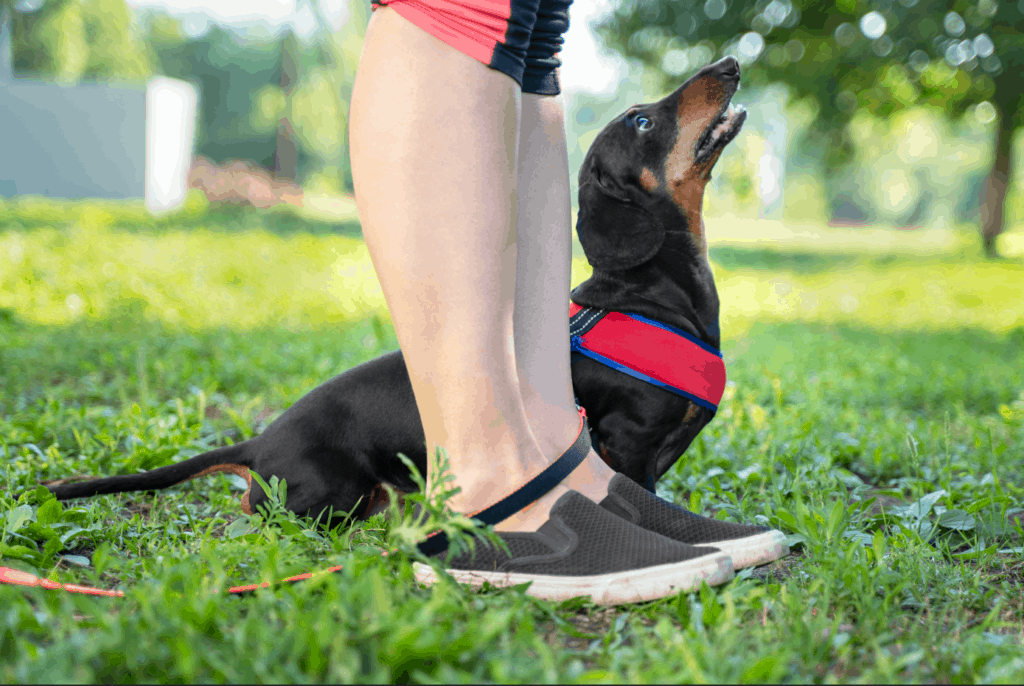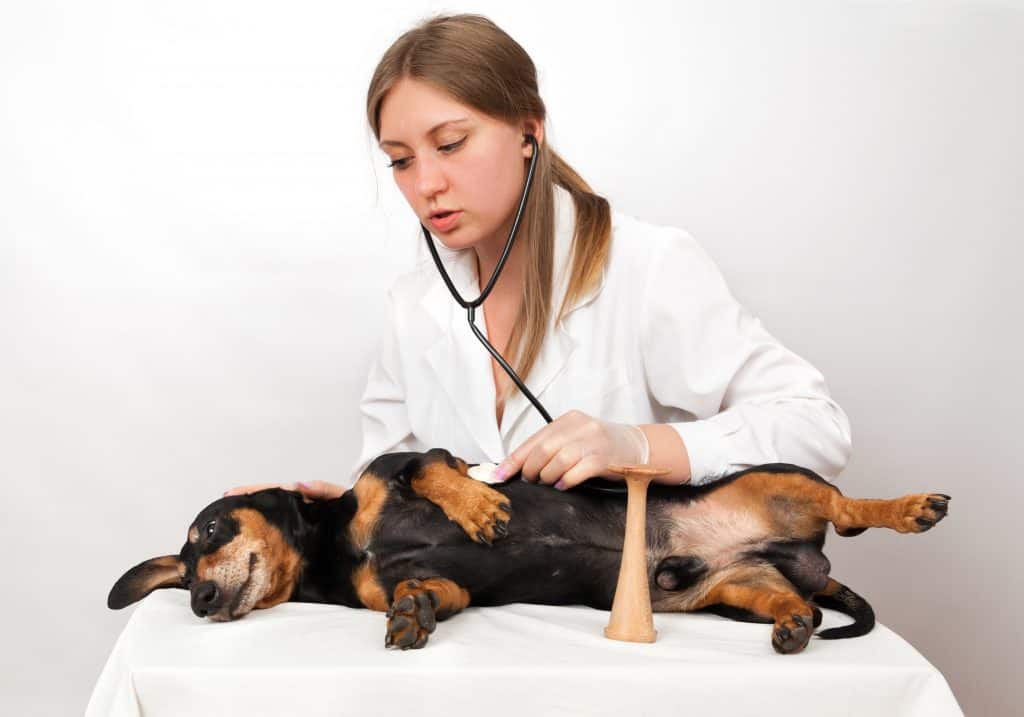If you’re the proud owner of a Dachshund, you know just how wonderful these little dogs can be. Their playful and loving nature makes them a joy to be around. However, owning a Dachshund comes with special responsibilities, particularly when it comes to their health and care needs. In this article, we’ll share some valuable tips and guidelines to help you ensure your Dachshund’s wellbeing.
Related post: How To Raise a Happy and Healthy Dachshund

Are Dachshunds high maintenance?
Dachshunds have a reputation for being high-maintenance dogs, but this isn’t entirely true. While Dachshunds do require specific care, they are relatively low maintenance compared to other breeds.
In terms of exercise, Dachshunds are active dogs and require daily walks and playtime to keep them healthy. These dogs tend to gain weight very easily, so it’s important to monitor their diet and exercise to prevent obesity.
Dachshund owners also need to keep in mind that these dogs have fragile backs. So, it’s best to avoid any jumping or other activities that may cause strain and injury. To ensure their safety, keep your dachshund away from stairs when possible.
When it comes to grooming, short-haired dachshunds don’t need a lot of grooming. Long-haired and wire-haired dachshunds do need to be groomed more frequently to prevent their coats from matting. All dachshunds shed moderately and only need to be bathed occasionally.
Overall, while Dachshunds do require some attention, they are not considered high-maintenance dogs and can make great companions for those willing to provide them with proper care.
If you want to know more about the costs of owning a dachshund. Read our post: Are Dachshunds Expensive to Own?
Important Dachshund Care Tips
Taking care of a dachshund is not difficult, but it does require a bit of commitment from the owners. Here are some tips to help your dachshund live his best life possible.
Good nutrition is key for dachshunds
Proper nutrition is essential for the health and well-being of your Dachshund. It’s important to choose high-quality dog food that is appropriate for their age, size, and activity level. You can consult with your veterinarian to determine the best diet for your Dachshund.
When feeding your Dachshund, it’s important to measure their food carefully to prevent overfeeding, which can lead to obesity, back problems, and other health issues. Dachshunds are prone to weight gain, so it’s important to monitor their weight and adjust their food intake as needed.
In addition to their regular meals, you can also provide your Dachshund with healthy treats and snacks in moderation. It’s important to choose treats that are low in calories and made with high-quality ingredients.
For a complete guide on what to feed your dachshund and most importantly how much to feed your pup, read our post: Dachshund Diet & Exercise
It’s also important to provide your Dachshund with fresh water at all times. You should clean and refill their water bowl daily to ensure that they always have access to clean drinking water.
Dachshunds need plenty of exercise and activity
Dachshunds require regular exercise to stay fit and healthy. However, it’s essential to avoid activities that could strain their backs, such as climbing stairs or jumping. Short walks on flat surfaces are recommended. Daily walks can be beneficial for their physical and mental health, and you can also provide your Dachshund with toys and activities that will keep them entertained and active all day long.
Daily walks can also provide important opportunities for socialization, mental stimulation, and bonding between you and your Dachshund. In addition to regular walks, you can also take your Dachshund to a dog park or other secured area where they can socialize and explore safely. It is recommended that you walk your Dachshund for 30 minutes to an hour every day to provide them with the exercise they need to stay healthy and happy.
When walking your Dachshund, it’s important to use a secure leash and harness to ensure their safety. Dachshunds have a strong prey drive and may be tempted to chase after small animals or run after scents, so it’s important to keep them on a leash at all times. Check out our list of the best harnesses for dachshunds.
In addition to daily walks, you can also provide your Dachshund with other forms of exercise and stimulation, such as playing fetch or agility training. Providing your Dachshund with regular exercise and mental stimulation can help prevent behavioral issues and keep them healthy and happy for years to come.
Related post: Is Running Bad for Dachshunds?

Dachshund Grooming and Hygiene
Proper grooming and hygiene are essential parts of caring for a Dachshund. Depending on the type of Dachshund you have, their grooming needs can vary.
Smooth-coated Dachshunds require less maintenance than their wirehaired counterparts, while longhaired Dachshunds require more attention to prevent matting and tangles. Understanding the specific grooming needs of your Dachshund is crucial to ensure their coat stays healthy and shiny.
- Smooth-Coated Dachshunds: Smooth-coated Dachshunds have a short, shiny coat. Their grooming needs are relatively low-maintenance compared to other Dachshund coat types. They shed moderately, so weekly brushing with a soft-bristled brush or grooming mitt is recommended to remove loose hair and keep their coat shiny. Smooth-coated Dachshunds may benefit from occasional professional grooming to trim their nails and keep their coat looking neat.
- Longhaired Dachshunds: Longhaired Dachshunds have a silky coat that is longer than the smooth-coated variety, with longer hair on their ears, chest, and underside. They require more grooming than smooth-coated dachshunds to keep their coat free from matting and tangles. Regular daily brushing with a slicker brush or pin brush is important to remove loose hair and prevent matting. Longhaired Dachshunds may also benefit from professional grooming to trim their coat and keep it looking tidy. Read more about long haired dachshund grooming here
- Wirehaired Dachshunds: Wirehaired Dachshunds have a dense, wiry coat. Their grooming needs are more extensive than smooth-coated or longhaired Dachshunds. Wirehaired Dachshunds need to be hand-stripped (the process of pulling out dead hair by hand) twice a year to maintain their coat’s texture and color. Regular brushing with a slicker brush or pin brush is also recommended to remove loose hair and prevent matting. Wirehaired Dachshunds also require professional grooming to maintain their coat’s shape and texture. Read more about Wire-haired Dachshund Grooming here
Overall, while the grooming needs of Dachshunds vary depending on their coat type, regular brushing, and grooming are important to keep their coats healthy and shiny. Professional grooming may also be necessary to maintain their appearance and keep them comfortable.
Check out our list of the best dachshund grooming tools
As a general guideline, it’s recommended to bathe a Dachshund every three months or as needed if they become particularly dirty or smelly. However, if your Dachshund has skin allergies or other skin conditions, your veterinarian may recommend more frequent bathing with a special medicated shampoo.
When bathing your Dachshund, use a mild, dog-specific shampoo and make sure to rinse thoroughly to avoid any leftover soap residue on their skin. Avoid getting water in their ears or eyes, and be sure to dry them off thoroughly after the bath to prevent moisture buildup and potential skin infections.
In addition to regular baths, Dachshunds should also have their nails trimmed every three to four weeks, their teeth brushed regularly to prevent dental issues, and their ears cleaned to avoid wax buildup and infections. Proper grooming and hygiene practices are important for maintaining your Dachshund’s overall health and well-being.
Related post: Why does my dachshund stink?
House training your dachshund: How to overcome the challenge
Dachshunds can be challenging to toilet-train due to their stubborn nature. Consistency and positive reinforcement are key to successful toilet training. It’s important to establish a routine and take them outside regularly to prevent accidents. Crate training can also be helpful in toilet training a Dachshund.
The first step in toilet training your Dachshund is to establish a consistent routine. This means taking them outside at regular intervals throughout the day, such as first thing in the morning, after meals, and before bedtime. It’s important to praise and reward your Dachshund every time they eliminate outside to reinforce the desired behavior.
It’s also important to supervise your Dachshund when indoors and watch for signs that they need to go outside, such as sniffing around or circling. If you catch your Dachshund in the act of eliminating indoors, interrupt them with a sharp noise or word and take them outside immediately to finish.
Consistency and positive reinforcement are key to successfully toilet training your Dachshund. Punishing or scolding your Dachshund for accidents can be counterproductive and may lead to anxiety and fear.
With patience and a little bit of effort, most Dachshunds can be successfully toilet trained. If you’re having trouble, consider seeking the help of a professional dog trainer for additional guidance.
Read more about Dachshund Potty Training in this post: How to Potty Train a Dachshund Puppy

Train your Pup and Socialize Them From an Early Age
Dachshunds are intelligent and stubborn dogs, so it is important to provide them with consistent training and socialization. You should start training them early and use positive reinforcement methods to reinforce good behavior. Consistency and patience are key to successful training.
Dachshunds are social animals and require proper socialization to develop good behavior and manners. You should expose your Dachshund from a young age to new people, animals, and environments to help him become a well-adjusted adult.
Here are some tips for training and socializing your Dachshund:
- Start training early: It’s best to start training your Dachshund as early as possible. They are intelligent dogs and can learn quickly, but consistency and patience are key.
- Use positive reinforcement: Dachshunds respond well to positive reinforcement, such as treats and praise. Avoid harsh punishment, as it can cause fear and anxiety in your dog.
- Explore new places and let them meet people and animals: Dachshunds can be wary of strangers and other dogs if not socialized properly. Expose your Dachshund to a variety of people, animals, and environments from an early age to prevent behavioral issues.
- Consider professional training: If you’re struggling with training your Dachshund or they’re displaying problematic behaviors, consider seeking help from a professional trainer.
Related post: Dachshund Training Guide: Tips & Tutorials to Train a Dachshund
Dachshunds need a cozy shelter where they can rest and feel safe
Give your dachshund a cozy dog crate or burrow bed to serve as his private haven and sleep spot. Place it in the corner of your bedroom or anywhere else he loves to hang around the house.
If you have children, teach them how important it is to leave them alone when he is snuggled up inside their place so that they can truly relax without any interruptions. Don’t let the crate symbolize punishment; instead make sure to fill it with treats so that whenever you tell him to, enter excitedly!
Dachshunds are not well-suited to living outside all the time, as they are small dogs with short legs and thin coats, making them sensitive to extreme temperatures like harsh winters. They also crave human attention and companionship and may become anxious or depressed if left alone outside for long periods.
Related post: Do dachshunds get cold easily?
While they can enjoy spending time outside in a secure, supervised area or going for walks, they should always have access to a comfortable, temperature-controlled indoor space where they can rest and sleep. By following these tips and guidelines, you can ensure that your Dachshund puppy grows up to be a healthy and well-behaved adult dog.

Dachshunds Care for Different Stages of Life
Every stage of life for a dachshund is important and requires special care. Puppies need lots of love, attention, and proper nutrition to grow into happy and healthy dogs. As young adults, dachshunds can be more independent but still require plenty of exercise and discipline to prevent them from becoming bored or destructive.
Adult dachshunds need regular visits to the vet and grooming to stay healthy and look their best. Senior dachshunds may slow down a bit and require special care for health issues associated with aging, such as arthritis, eye problems, obesity, or dental disease. Keeping up with preventative medicine is key to happy senior years. Proper nutrition and exercise are still important even as dachshunds age.
No matter the stage of life, all Dachshunds need lots of love and attention from their owners to stay happy and healthy. Regular outings for exercise, playtime, and socialization will help ensure that your Dachshund is content in every stage of life. With the right care, your Dachshund can live a long and healthy life full of love and companionship.
Related post: How long will my dachshund live?
How to Care for a Pregnant Dachshund
As a responsible pet owner, it is essential to provide proper care and support for your pregnant dachshund. Pregnancy can be challenging for any dog, including dachshunds, so here are some tips on how to care for them:
- Proper nutrition and feeding for pregnant dachshunds: During her pregnancy, your dachshund will require a nutritious and balanced diet to support her health and the growth of her puppies. It is recommended to feed her high-quality commercial dog food specially formulated for pregnant or nursing dogs. You can also consult your veterinarian for dietary recommendations and supplements.
- Exercise and physical activity during pregnancy: Regular exercise is crucial for pregnant dachshunds to maintain their health and prevent obesity. However, it is essential to avoid strenuous activities or overexertion, which can harm the puppies or the mother. Gentle walks or light playtime in a secure and safe environment are ideal for pregnant dachshunds.
- Comfortable birthing area: As the due date approaches, you should prepare a quiet and comfortable space for your dachshund to give birth and care for her puppies. This area should be warm, dry, and away from any distractions or loud noises. It would help if you also had essential supplies such as clean towels, blankets, and a heating pad ready in preparation for the arrival of the puppies.
- Regular veterinarian check-ups: Throughout the pregnancy, it is essential to schedule regular check-ups with your veterinarian to monitor your dachshund’s health and the development of her puppies. Your veterinarian can also advise on any necessary vaccinations or treatments to ensure a healthy pregnancy and birth.
Related post: Dachshund Pregnancy: What to expect
How to Care for a Senior Dachshund
As your dachshund ages, she may require special care and attention to maintain her health and well-being. Here are some tips on how to care for a senior dachshund:
- Special diets and nutrition for senior dachshunds: Senior dachshunds have different nutritional needs than younger dogs. It is important to feed them a balanced and nutritious diet that meets their specific requirements. You should consult your veterinarian for dietary recommendations or consider a commercial dog food specially formulated for senior dogs.
- The importance of exercise for senior dachshunds: Regular exercise is crucial to maintaining mobility, weight, and overall health for senior dachshunds. It is important to adjust the exercise routine according to their physical abilities to avoid overexertion or injury. Gentle walks, light playtime, and swimming are all great options for senior dachshunds.
- Joint care and pain management for senior Dachshunds: Dachshunds are prone to joint problems, such as arthritis, as they age. It is important to provide joint care supplements, regular joint massages, and low-impact exercise routines to prevent joint pain and stiffness. You can also consult your veterinarian for pain management options if necessary.
- Regular veterinarian check-ups and health screenings: Senior Dachshunds should undergo regular veterinarian check-ups and health screenings to monitor their health, detect any underlying medical conditions, and receive proper treatment. It is recommended to schedule check-ups every six months for senior Dachshunds.
Related post: How to care for an old dog
How to Care for a Dachshund Puppy
Raising a Dachshund pup is not an easy feat. With the right care and attention, you can ensure your new furry friend grows up happy and healthy! Follow these steps to make sure they get the best start in life:
- Feeding and Nutrition for Dachshund Puppies: Dachshund puppies require a nutritious and balanced diet to support their growth and development. You can consult your veterinarian for dietary recommendations, or consider a high-quality commercial dog food formulated for puppies.
- Socialization and Training for Puppies: Training and socialization are an absolute must for Dachshund puppies to cultivate desirable behavior and obedience. You can sign up your pup in puppy group classes or training courses while exposing them to exciting people, animals, and atmospheres!
- Proper Exercise and Physical Activity for Puppies: Regular exercise is important for Dachshund puppies to develop their muscles, coordination, and overall health. However, it is important to avoid strenuous activities or overexertion, which can harm the puppy’s growth and development. Short walks, playtime, and interactive toys are great options for Dachshund puppies.
- Regular veterinarian check-ups and vaccinations: Dachshund puppies should undergo regular veterinarian check-ups and complete the vaccine schedule to prevent diseases and secure their proper growth and development. It is recommended to schedule check-ups every few weeks until the puppy reaches four months of age.
Related post: How To Raise a Happy and Healthy Dachshund

Challenges of Owning a Dachshund
While dachshunds are great dogs, they have some unique characteristics that can make them challenging to own. But don’t worry, with the right care and attention, your dachshund will be a loyal, loving companion for years to come.
By understanding dachshunds’ specific needs and properly caring for them, you can ensure they remain happy and healthy.
Health and Wellness
Dachshunds are prone to certain health concerns, including back problems, dental issues, and obesity. However, by providing proper care and attention, these health concerns can be prevented or managed. It’s important to be aware of these potential health problems so you can take steps to prevent them or catch them early.
- Obesity: One of the most common health issues that dachshunds face is obesity. These dogs love to eat, and they tend to gain weight easily. Being overweight can lead to a variety of health problems, including joint pain, heart disease, and diabetes. To keep your dachshund at a healthy weight, make sure to feed them a balanced diet and provide plenty of physical activity.
- Back Problems: Another common health issue in dachshunds is back problems. Dachshunds have long backs and short legs, which puts them at risk for spinal problems like herniated discs. To prevent back problems, it’s important to make sure your dachshund doesn’t jump off high furniture or go up and down stairs too often.
- Dental issues: Dachshunds are also prone to dental problems, like periodontal disease. To keep your dog’s teeth and gums healthy, make sure to brush their teeth regularly and provide them with dental chews and toys.
Finally, dachshunds are at a higher risk for certain conditions, like Diabetes and Cushing’s disease. Make sure to talk to your vet regularly about any potential health concerns you may have.
If you’re considering getting a dachshund, make sure to choose a reputable breeder who tests their dogs for these conditions.
Related post: Common health problems in dachshunds

Behavioral Issues in Dachshunds
Dachshunds can exhibit behavioral issues if not properly trained and socialized. Here are some common behavioral issues that Dachshund owners may encounter:
- Separation anxiety: Dachshunds are social animals and can suffer from separation anxiety if left alone for long periods. This can lead to destructive behaviors such as chewing or barking excessively. Learn more about separation anxiety and how to deal with it here.
- Aggression: Dachshunds may exhibit aggression towards strangers or other dogs, especially if they are not properly socialized. This can be addressed through positive reinforcement training and socialization. Learn more about Dachshund Aggression and how to prevent it here.
- Barking: Dachshunds are known to be vocal and may bark excessively if not trained to do otherwise. This can be addressed through positive reinforcement training.
- House training: As mentioned earlier, Dachshunds may be difficult to house train. It is important to establish a consistent routine and reward good behavior.
- Digging: dachshunds are known for being prone to digging. This behavior is instinctual for many dogs and can be particularly strong in dachshunds, as they were originally bred as hunting dogs that would dig after prey. Check out this related post: How To Dachshund Proof Your Home & Garden
It is important to address any behavioral issues early on through proper training and socialization. If you are having trouble with your Dachshund’s behavior, consult with a professional dog trainer or behaviorist for guidance. Read more about Dachshund Behavioral Issues and how to resolve them here
Overall, Dachshunds make wonderful pets with proper care and attention. By understanding their unique needs and behaviors, you can provide them with a happy and healthy life.
Related post: 3 Ways to Help Your Dachshund with Anxiety
Things to consider before getting a Dachshund
Before bringing a dachshund into your home, there are some other things to consider.
- Dachshunds need some space: Dachshunds do not require a lot of space and can make amazing city and apartment dogs. However, they still need room to play and exercise. Make sure you have enough room for your dachshund to move around comfortably.
- Dachshunds don’t like being alone: Dachshunds can become quite distressed when left alone which may lead to destructive behavior such as inappropriate chewing and accidents in the house. Dachshunds are social animals and crave human interaction. Leaving them alone for long periods can lead to separation anxiety and destructive behavior.
- Dachshunds may not be a good choice for families with small children: Dachshunds can be good family pets, but it’s important to remember that they are small dogs with an independent streak. As such, they need proper socialization and training from an early age to get along with children and other animals. In general, dachshunds do best with older children who understand how to be gentle and respectful of animals. Younger children should always be supervised when around dachshunds as they may not understand their size and temperament.
Related post: Are Dachshunds Good with Kids?
Overall, dachshunds can be great family pets when given the proper training and socialization they need from an early age. With a little bit of patience and understanding, dachshunds can get along well with children and other animals in the household.

Conclusion
In conclusion, caring for a Dachshund involves meeting its specific needs, including proper nutrition, exercise, socialization, grooming, and attention. It’s important to understand that Dachshunds are social dogs that require companionship and should not be left alone for extended periods.
Additionally, while Dachshunds have short, smooth coats that don’t require frequent bathing, regular grooming, and brushing is necessary to keep their coat healthy and prevent matting.
By providing your Dachshund with the care and attention they need, you can ensure they live a happy and healthy life. Whether you have a Dachshund puppy or an adult Dachshund, taking the time to properly care for them will help strengthen the bond between you and your furry friend. Remember, Dachshunds are loyal and loving companions that deserve the best care possible.
Recent Posts
Calculate the perfect food portions for your dachshund with our specialized calculator. Get customized feeding recommendations based on size, age, and activity level to support your wiener dog's back...
Looking for the perfect gift for a proud dachshund mom? We’ve rounded up the cutest dachshund shirts that celebrate your love for wiener dogs in style. Whether you’re shopping for yourself or a...


